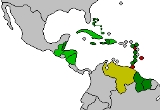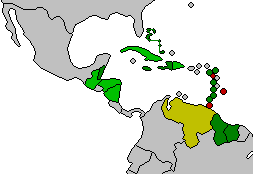
Petrocaribe
Encyclopedia

Caribbean
The Caribbean is a crescent-shaped group of islands more than 2,000 miles long separating the Gulf of Mexico and the Caribbean Sea, to the west and south, from the Atlantic Ocean, to the east and north...
oil alliance with Venezuela
Venezuela
Venezuela , officially called the Bolivarian Republic of Venezuela , is a tropical country on the northern coast of South America. It borders Colombia to the west, Guyana to the east, and Brazil to the south...
to purchase oil
Oil
An oil is any substance that is liquid at ambient temperatures and does not mix with water but may mix with other oils and organic solvents. This general definition includes vegetable oils, volatile essential oils, petrochemical oils, and synthetic oils....
on conditions of preferential payment. The alliance was launched in June 2005. The payment system allows for a few nations to buy oil on market value
Market value
Market value is the price at which an asset would trade in a competitive auction setting. Market value is often used interchangeably with open market value, fair value or fair market value, although these terms have distinct definitions in different standards, and may differ in some...
but only a certain amount is needed up front; the remainder can be paid through a 25 year financing agreement on 1% interest. The deal allows for the Caribbean nations to purchase up to 185000 barrels (29,412.6 m³) of oil per day on these terms. In addition it allows for nations to pay part of the cost with other products provided to Venezuela, such as bananas, rice, and sugar.
General Aspects
"PetroCaribe will only deal with a state controlled entity, meaning that the PetroCaribe agreement is based on eliminating all intermediaries." Only state-run entities, not private businesses, can deal with PetroCaribe. The Venezuelan state oil company rejects business dealings with any private oil company in these countries, believing these private companies to be corrupt and criminal in their operations.Twelve of the fifteen members of CARICOM plus Cuba
Cuba
The Republic of Cuba is an island nation in the Caribbean. The nation of Cuba consists of the main island of Cuba, the Isla de la Juventud, and several archipelagos. Havana is the largest city in Cuba and the country's capital. Santiago de Cuba is the second largest city...
and the Dominican Republic
Dominican Republic
The Dominican Republic is a nation on the island of La Hispaniola, part of the Greater Antilles archipelago in the Caribbean region. The western third of the island is occupied by the nation of Haiti, making Hispaniola one of two Caribbean islands that are shared by two countries...
signed the agreement on 7 September 2005. The nations signing the agreement were Antigua and Barbuda
Antigua and Barbuda
Antigua and Barbuda is a twin-island nation lying between the Caribbean Sea and the Atlantic Ocean. It consists of two major inhabited islands, Antigua and Barbuda, and a number of smaller islands...
, the Bahamas, Belize
Belize
Belize is a constitutional monarchy and the northernmost country in Central America. Belize has a diverse society, comprising many cultures and languages. Even though Kriol and Spanish are spoken among the population, Belize is the only country in Central America where English is the official...
, Cuba
Cuba
The Republic of Cuba is an island nation in the Caribbean. The nation of Cuba consists of the main island of Cuba, the Isla de la Juventud, and several archipelagos. Havana is the largest city in Cuba and the country's capital. Santiago de Cuba is the second largest city...
, Dominica
Dominica
Dominica , officially the Commonwealth of Dominica, is an island nation in the Lesser Antilles region of the Caribbean Sea, south-southeast of Guadeloupe and northwest of Martinique. Its size is and the highest point in the country is Morne Diablotins, which has an elevation of . The Commonwealth...
, the Dominican Republic
Dominican Republic
The Dominican Republic is a nation on the island of La Hispaniola, part of the Greater Antilles archipelago in the Caribbean region. The western third of the island is occupied by the nation of Haiti, making Hispaniola one of two Caribbean islands that are shared by two countries...
, Grenada
Grenada
Grenada is an island country and Commonwealth Realm consisting of the island of Grenada and six smaller islands at the southern end of the Grenadines in the southeastern Caribbean Sea...
, Guyana
Guyana
Guyana , officially the Co-operative Republic of Guyana, previously the colony of British Guiana, is a sovereign state on the northern coast of South America that is culturally part of the Anglophone Caribbean. Guyana was a former colony of the Dutch and of the British...
, Jamaica
Jamaica
Jamaica is an island nation of the Greater Antilles, in length, up to in width and 10,990 square kilometres in area. It is situated in the Caribbean Sea, about south of Cuba, and west of Hispaniola, the island harbouring the nation-states Haiti and the Dominican Republic...
, Nicaragua
Nicaragua
Nicaragua is the largest country in the Central American American isthmus, bordered by Honduras to the north and Costa Rica to the south. The country is situated between 11 and 14 degrees north of the Equator in the Northern Hemisphere, which places it entirely within the tropics. The Pacific Ocean...
, Suriname
Suriname
Suriname , officially the Republic of Suriname , is a country in northern South America. It borders French Guiana to the east, Guyana to the west, Brazil to the south, and on the north by the Atlantic Ocean. Suriname was a former colony of the British and of the Dutch, and was previously known as...
, St Lucia, St Kitts and Nevis, and Saint Vincent and the Grenadines
Saint Vincent and the Grenadines
Saint Vincent and the Grenadines is an island country in the Lesser Antilles chain, namely in the southern portion of the Windward Islands, which lie at the southern end of the eastern border of the Caribbean Sea where the latter meets the Atlantic Ocean....
. The only countries to choose not to sign on were Barbados
Barbados
Barbados is an island country in the Lesser Antilles. It is in length and as much as in width, amounting to . It is situated in the western area of the North Atlantic and 100 kilometres east of the Windward Islands and the Caribbean Sea; therein, it is about east of the islands of Saint...
and Trinidad and Tobago
Trinidad and Tobago
Trinidad and Tobago officially the Republic of Trinidad and Tobago is an archipelagic state in the southern Caribbean, lying just off the coast of northeastern Venezuela and south of Grenada in the Lesser Antilles...
. Haiti
Haiti
Haiti , officially the Republic of Haiti , is a Caribbean country. It occupies the western, smaller portion of the island of Hispaniola, in the Greater Antillean archipelago, which it shares with the Dominican Republic. Ayiti was the indigenous Taíno or Amerindian name for the island...
was not invited to the talks, since Venezuela did not recognize its US-installed government. The country finally joined the alliance in April 2006, once the newly-elected president René Préval
René Préval
René Garcia Préval is a Haitian politician and agronomist who was the President of the Republic of Haiti from 14 May 2006 to 14 May 2011. He previously served as President from February 7, 1996, to February 7, 2001, and as Prime Minister from February 1991 to October 11, 1991.-Early life and...
took office. Honduras
Honduras
Honduras is a republic in Central America. It was previously known as Spanish Honduras to differentiate it from British Honduras, which became the modern-day state of Belize...
, which is not a member of CARICOM, became the 17th member of the alliance in December 2007. Guatemala
Guatemala
Guatemala is a country in Central America bordered by Mexico to the north and west, the Pacific Ocean to the southwest, Belize to the northeast, the Caribbean to the east, and Honduras and El Salvador to the southeast...
joined in July 2008.
Reasons for the holdout
Although it is understandable that Trinidad and Tobago did not sign the agreement, being oil producers themselves, many have wondered about Barbados. Some have speculated that they have succumbed to pressure from the United States, because of their strained relationship with Venezuela. Barbados has denied that this is the reason, and has not ruled out agreeing to Petrocaribe in the future. On August 31, 2005, energy minister Anthony Wood said that they are weighing options over signing Petrocaribe or maintaining their. On 1 September 2005, Wood leaned towards acknowledging that Barbados would sign the agreement, given that changes are made to the original agreement. It is not known what changes are expected, but it does seem clear that the rise in international oil prices has contributed to the change of mind from Barbados. Barbados has since hinted that Petrocaribe would add a considerable amount of debt to the Barbados economy.In April 2011 Hugo Chavez renewed his offer for Barbados to join PetroCaribe.
Criticism
While the agreement offers concessionary financing to these heavily indebted nations, it places them in a financial bind by allowing them to pay with agricultural goods (whose value fluctuates greatly from week to week) for part of their fuel bills. These nations ultimately take on more debt to pay these bills.Another problem is that because it creates the illusion that fuel can be procured cheaply (even when it is expensive), the scheme increases the region's short- and long-term dependence on fossil fuels. Opponents of the scheme point out that this is counter to the region's energy security interests.
Additionally, open press reporting has documented that the majority of the signatory countries are either not receiving fuel shipments or are receiving sporadic shipments that do little to meet the internal needs of these nations. Only Jamaica and Cuba are receiving regular shipments, and it is widely rumored that Cuba is paying very little or nothing at all for its fuel shipments, owing to Venezuelan president Chavez's friendship with the Cuban government. Venezuelan oil minister Rafael Ramirez acknowledged in December 2007 that his nation was shipping far less oil than previously expected; Petrocaribe members receive 145000 barrels (23,053.2 m³) daily (rather than the 300000 barrels (47,696.2 m³) initially planned), and of these, 95,000 go to Cuba.
See also
- SUCRE (currency)
- Petróleos de Venezuela
- History of Venezuelan Oil Industry
- Corporación Trebol Gas C.A.Corporación Trebol Gas C.A.Corporación Trebol Gas C.A. is a Venezuelan privately owned oil company reporting 280 gas stations located in every state of the country and about 16% of the oil distribution market in Venezuela. Trebol was founded in 1998 and is a chain of gas stations, each operated by a franchisee...
External links
- Like Sucre in Ayacucho! - Speech by President Hugo Chávez to the 6th Petrocaribe Summit

